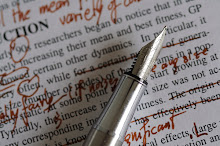"I believe more in the scissors than I do in the pencil." ~Truman Capote
The revision process isn’t fun for every writer. I’ve heard some say it is where the real writing begins while others would rather stab their eye out with a fork than even tackle such a monstrous feat. There are also those who believe their first instincts are right and roll with a first draft. A foolish concept if you ask me, and one that will only produce an inflated manuscript. Even the best writers need to revise.
One common thread among the submissions we’ve received is the need for at least one more round of edits. Some need more than that, but there are several who just need to declutter and trim. They need to lose some fat and get that ’script trim and in primetime fighting condition.
Just like the contestants on Biggest Loser, it’s not as easy as simply cutting back a donut or two or in a writer’s case an –ly word. You have to dig deep and take one-step at a time—one crunch, one pull-up. Have you ever noticed how hard push-ups are the first time you do them? I used to do thirty every night. (Yeah, I’m not sure what happened to me.) As I got older, ten killed me. Okay, five. But I could do one; the next night maybe two. I took it slow and made my way to ten.
The same can be said for writing. Trim up a bit of fat and you’ll see a difference instantly.
I like to feel and see success quickly so I’ve developed my own system of revision. It works for me, spurs me on for the big manuscript overhaul. But, I have to start small or I’ll lose myself in all the fat.
Phase one: Get rid of all the unnecessary words and phrases
These are all the words you don’t need. I think every writer is different because we all tend to use certain repeaters. If you’ve ever read rough drafts for other writers, you’ll know what I’m talking about. It seems like the writer picked one word and rolled with it over and over and over again. Here’s a few in my checklist. I don’t have the space on this blog to put them all so I’ll just give you a few.
Just, so, well—I am a horrible “well-er”. I use it in dialogue constantly. I try to destroy most of these words as possible.
Up, believed, knew, saw, felt—(assuming third person)
Ex: “I stood up.” I know there’s the phrase “stand down” but . . . Same can go for “down”. I was actually surprised how often I did this. So although I know better than when I wrote my first manuscript, I always do a quick search.
“She felt his hand graze her back.” Change to: “His hand grazed her back.” (same idea applied to believed, saw, knew)
You also want to be careful whenever you see the word “felt” are you telling? Are you giving your reader the experience of whatever emotion you are saying he/she feels or are you simply saying “I felt frustrated.” R.U.E.
Adverbs: Adverbs in dialogue need to go, no matter what. And if you must use them in narrative, use them sparingly. It’s not that I hate adverbs, in fact, I think sometimes there is nothing like a unique adverb—just have to be clever if you’re using it.
Adverbs are lazy writing. “She smiled seductively.” Boring. Show me seduction, infer seduction, do whatever just don’t tell me she is seductive. Adverbs fall in the R.U.E. category as well. We don’t trust our reader to pick up that this chick is hot for whoever she is smiling seductively at, so we need to make sure we tell them. Chances are we’ve already hit that point, but we can’t resist the urge to go for it one more time.
Phase two:Kill clichés
I have my own kill list, but you may find one online. I know which ones I tend to use more often than not and I add to the list with each manuscript I finish. Clichés are played out—get rid of them. They are someone else’s creation. Use your own brain and think of something clever all by your lonesome. At this point, I also search “like” and “as” to trim up some unnecessary metaphors or similes. If you need to more than a minute or two finding a new way to replace the cliché, simply highlight the section and move on. You need to feel the success of the extra push up.
Phase three: “To be verbs.”
This one is not fun. Search was/were and highlight them. Your manuscript will be a coat of many colors but you’ll accomplish two things with this. You’ll be able to identify weak verbs and rework passive voice.
“Was” by itself isn’t passive; it is weak. I’ve read blogs that assert the opposite and often label “was” as being passive. It’s just a crappy verb and doesn’t do much for the experience of writing. If you haven’t heard me nag about this before here’s a quick low down. Would you rather read a book? Or experience life and love, magic, fantasy, whatever first hand? Make your readers forget they are reading and I bet you’ll have an audience for life.
Okay, back to passive voice.
Passive voice is when the object of the sentence is the doer, rather than the subject.
“The girl was bit by the dog.”
Should be: “The dog bit the girl.” (5 words compared to 7)
The subject is clear and the sentence is concise. Not only does passive voice sound confusing, it’s wordy. Your best writing won't come out of clever prose or weighty description. It will be from clear and concise writing free from fat, pompous language, and in as little words as possible.
I have several other things I like to search prior to jumping in the revision pool, but I’d like to hear yours? What is on your kill list? Double predicates? Expletives? Adjectives?








5 comments:
I'm doing the opposite right now--fattening up my draft.
Some people dread editing. If I could edit all day every day I'd be in heaven! Right now I'm in the process of filling my characters out more and enriching the language surrounding them. Along the way I'm cutting was/were and getting creative with adverbs. Next couple edits I'll aim to trim, but it does go both ways.
Great post!
I actually prefer the revision process more than hammering down the first draft, because it's less scary, and it appeals to my perfectionist side.
Nancy
http://chickdickmysteries.com
Great advice. I've been searching my "could be" phrases. Man . . . not fun LOL!
Forgive my ignorance, but what does R.U.E. stand for?
Oh boy, Ladystef. I was going to put a link to a previous blog of mine, but I totally spaced it. RUE means: Resist The Urge To Explain. I will put a link to the other blog post to explain further. Thanks for bringing it up.
Post a Comment